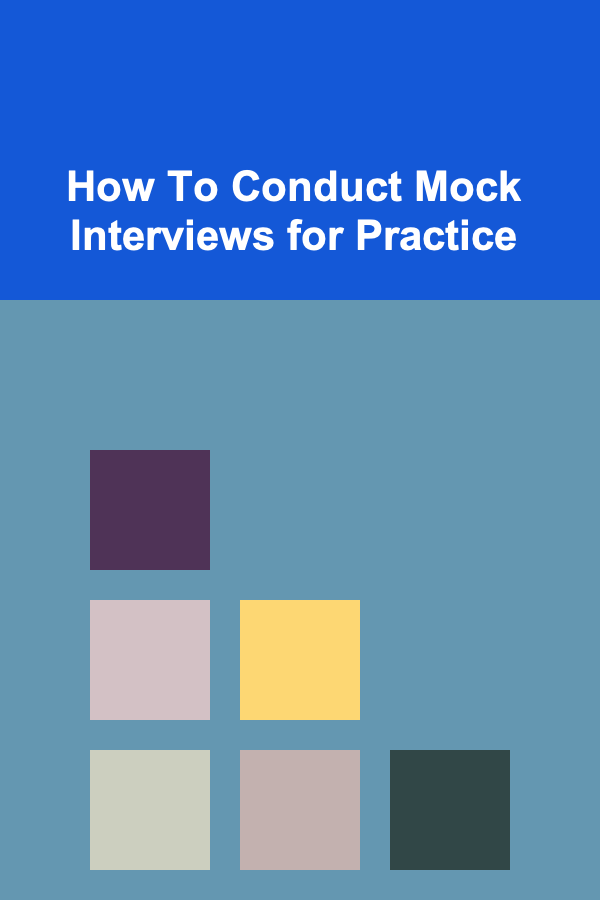
How To Conduct Mock Interviews for Practice
ebook include PDF & Audio bundle (Micro Guide)
$12.99$5.99
Limited Time Offer! Order within the next:

Mock interviews are a powerful tool for preparing for the real thing, whether it's for a job, college admission, or any other opportunity. They allow individuals to simulate the experience of an actual interview, providing them with a chance to hone their skills, manage anxiety, and receive feedback. This article will delve into the significance of mock interviews, how to conduct them, and how they can enhance performance in real-life interviews.
The Importance of Mock Interviews
1. Boost Confidence
One of the primary benefits of mock interviews is the confidence they build. Interviews can be nerve-wracking, especially when the stakes are high. By practicing in a simulated environment, individuals become familiar with the process, helping to reduce anxiety and increasing self-assurance. The more you practice, the more comfortable you will feel in the actual interview scenario.
2. Understand the Interview Process
Mock interviews provide an opportunity to understand the interview process better. It helps candidates become familiar with the typical structure of an interview, including the questions they might encounter, the flow of the conversation, and how to address various interview formats (e.g., behavioral, technical, or case interviews). This familiarity can prevent unexpected surprises during the actual interview.
3. Receive Constructive Feedback
Another key aspect of mock interviews is the ability to receive feedback. Practicing with a knowledgeable interviewer provides insights into what you're doing right and areas for improvement. Whether it's your body language, tone of voice, or responses to specific questions, feedback helps refine your performance.
4. Practice Specific Skills
Mock interviews allow you to focus on particular skills, such as:
- Answering questions succinctly: The ability to express ideas clearly and concisely is essential.
- Non-verbal communication: Body language, posture, and eye contact all play a significant role in interviews.
- Technical competence: For technical roles, mock interviews can help candidates practice problem-solving skills or coding exercises.
- Behavioral responses: For roles requiring soft skills, mock interviews provide an opportunity to practice answers to situational or behavioral questions (e.g., "Tell me about a time when you overcame a challenge").
Types of Mock Interviews
1. Peer-to-Peer Mock Interviews
Peer-to-peer mock interviews involve practicing with friends, classmates, or colleagues. This is a less formal type of mock interview but can be incredibly beneficial. Peers might not always have the expertise of an HR professional, but they can still ask typical interview questions and offer valuable feedback based on their own experiences. These types of interviews allow you to get comfortable speaking in front of someone and help you practice answering under pressure.
2. Mock Interviews with Professionals
Professional mock interviewers are often former recruiters, HR specialists, or career coaches who can provide expert feedback. These interviews tend to be more structured and rigorous. Professionals can simulate more complex interview scenarios, provide industry-specific insights, and offer targeted feedback on your strengths and weaknesses. This type of mock interview is ideal for serious job seekers or individuals preparing for highly competitive positions.
3. Group Mock Interviews
In a group mock interview scenario, a candidate practices in front of a panel or multiple interviewers. This is beneficial for preparing for group interviews, where interviewers assess multiple candidates at once, and when you're dealing with a panel of experts. Group mock interviews can be more intense and may test your ability to manage multiple questions simultaneously and respond effectively to different perspectives.
4. Video Mock Interviews
Video mock interviews have become increasingly popular with the rise of remote work and virtual interviews. This type of mock interview mimics the conditions of a video interview, where the candidate interacts with an interviewer via platforms like Zoom or Skype. Video mock interviews help you practice with camera presence, manage technical issues, and focus on speaking clearly and confidently to a virtual audience.
5. Technical Mock Interviews
Technical mock interviews are tailored to roles that require specific technical expertise, such as software development, engineering, or data science. These mock interviews often include coding challenges, problem-solving exercises, and technical questions to test the candidate's knowledge in their field. Technical mock interviews are essential for preparing for jobs that involve coding assessments or complex problem-solving tasks.
Steps to Conduct a Mock Interview
1. Define the Purpose
Before conducting a mock interview, clearly define its purpose. Are you focusing on improving your general interview performance, preparing for a specific role, or practicing technical skills? Understanding the objective of the mock interview will help shape the questions and format. For instance, a mock interview for a marketing role would emphasize communication skills and creativity, while one for a software developer would focus on coding challenges and technical problem-solving.
2. Prepare the Interview Format
The interview format should resemble the real interview as closely as possible. Consider the following aspects:
- Interview structure: Most interviews follow a standard structure, such as an introduction, questions about your experience, behavioral questions, technical questions, and a closing.
- Time: Real interviews typically last between 30 minutes to an hour. Ensure your mock interview matches this timeframe to replicate the real experience.
- Questions: Research common questions for the role you're applying for. Use questions that test your skills, experience, and how you handle various work situations. Practice answering a mix of behavioral, situational, and technical questions (if applicable).
- Setting: Conduct the mock interview in a quiet and professional environment. The setting should resemble a real interview to make the experience as realistic as possible.
3. Role-Play the Interview
If you're conducting a peer-to-peer mock interview, both you and your partner should role-play the interview. One person should be the interviewer, and the other should be the candidate. The interviewer should ask questions relevant to the job or college program being applied to, while the candidate should answer as they would in an actual interview.
For professional mock interviews, the interviewer should take the role seriously, asking questions with a tone and approach similar to that of an actual recruiter. Both parties should follow the interview etiquette, such as starting with introductions and maintaining a formal demeanor.
4. Record and Review
Recording your mock interview is one of the most effective ways to improve your performance. Watching the recording will give you insight into your body language, tone of voice, and response style. You can also observe any areas where you may have hesitated, been unclear, or struggled to explain certain concepts. Reviewing the recording is crucial to gaining awareness of the subconscious habits that could negatively impact your performance.
5. Provide Constructive Feedback
Feedback is the key to improving through mock interviews. After the mock interview, the interviewer (or peer) should provide specific feedback on both strengths and areas for improvement. This feedback should cover:
- Content: Did the candidate answer the questions clearly? Were the answers focused and relevant to the question?
- Communication: Did the candidate speak clearly and confidently? Did they make good use of body language and maintain eye contact?
- Behavioral Insights: Did the candidate provide real-life examples when answering behavioral questions? Were they able to showcase skills relevant to the role?
- Time Management: Did the candidate keep their answers concise? Did they stay within the allotted time?
Both parties should keep the tone of feedback constructive and encouraging to help the candidate improve rather than feel discouraged.
6. Practice, Practice, Practice
One mock interview is often not enough. To truly benefit from mock interviews, practice multiple times with different formats and types of interviewers. Consistency will help you refine your responses, improve your delivery, and become more adaptable to various interview scenarios. Each mock interview will reveal new areas for improvement, and over time, you will develop a more polished and confident interview presence.
How Mock Interviews Improve Specific Skills
1. Handling Stress
Real interviews often trigger anxiety, but mock interviews allow you to practice managing that stress. Over time, you will become more comfortable with the pressure of being asked questions on the spot. You will learn how to pause, think critically, and answer without feeling rushed. The more mock interviews you do, the more you will feel prepared for any situation in a real interview.
2. Enhancing Communication Skills
Communication is a key factor in interviews. Mock interviews allow you to practice articulating your thoughts clearly and concisely. This will help you answer questions more effectively, engage with interviewers, and make a strong impression. You will also become more aware of your non-verbal communication, such as gestures and posture, which plays a crucial role in conveying confidence and professionalism.
3. Improving Technical Skills
For technical interviews, mock interviews allow you to work through complex problems in real-time. Whether it's solving a coding challenge, completing a design task, or answering theoretical questions, mock interviews provide a safe space to practice these tasks under the time constraints typically found in real interviews.
Conclusion
Mock interviews are an essential part of interview preparation. They provide candidates with the opportunity to practice their responses, receive feedback, and improve their performance in a low-pressure setting. By conducting mock interviews, individuals can build confidence, refine their skills, and increase their chances of success in the real interview. Whether you're preparing for a job, a college application, or a technical challenge, mock interviews are an invaluable tool for improving interview performance.
Reading More From Our Other Websites
- [Rock Climbing Tip 101] How to Choose the Perfect Chalk Bag for High‑Altitude Alpine Ascents
- [Organization Tip 101] How to Use a Miter Saw for Perfect Crown Molding Cuts
- [Home Cleaning 101] How to Deep Clean a Closet and Maximize Space
- [Home Security 101] How to Train Your Family on Home Security Best Practices
- [Home Soundproofing 101] How to Soundproof a Townhouse: Effective Solutions for Multi-Unit Living
- [Trail Running Tip 101] Best High‑Altitude Acclimation Techniques for Alpine Trail Runners
- [Metal Stamping Tip 101] Top 7 Design Tips for Flawless Custom Metal Stamps
- [Home Lighting 101] How to Use Lighting to Highlight Your Home's Best Features
- [Home Soundproofing 101] Best Home Soundproofing for Apartments: Maximizing Quiet with Minimal Investment
- [Home Soundproofing 101] How to Achieve Airborne Noise Reduction for a Quieter Home Environment

How to Design a Checklist for Re-engaging Inactive Email Subscribers
Read More
How to Set the Table for a Holiday Feast with Elegant Decor
Read More
How to Soundproof a Room for Better Sleep Quality
Read More
How to Create Custom Dollhouse Rugs and Carpets
Read More
10 Tips for Optimizing 3D Models for 3D Printing
Read More
10 Tips for Effective Collaboration in AI Research
Read MoreOther Products

How to Design a Checklist for Re-engaging Inactive Email Subscribers
Read More
How to Set the Table for a Holiday Feast with Elegant Decor
Read More
How to Soundproof a Room for Better Sleep Quality
Read More
How to Create Custom Dollhouse Rugs and Carpets
Read More
10 Tips for Optimizing 3D Models for 3D Printing
Read More